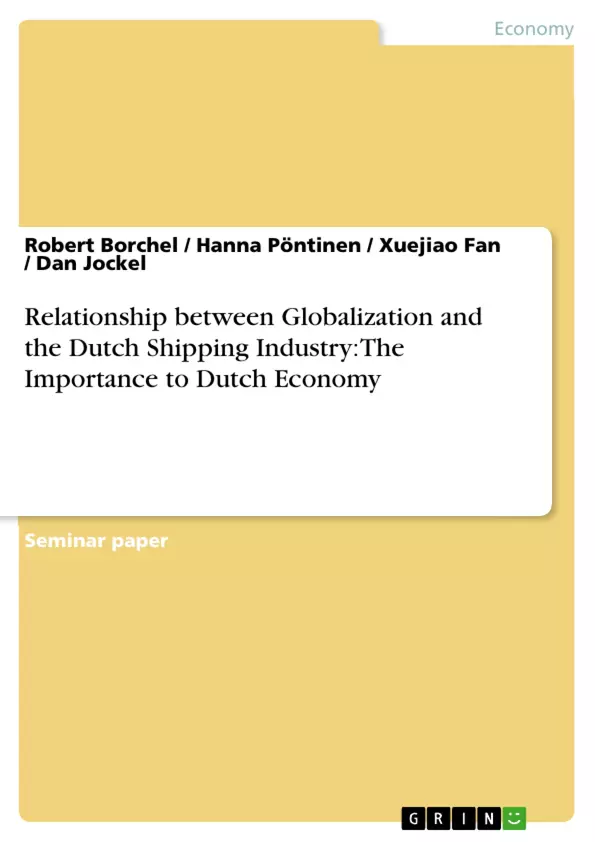The following report gives a review about the relationship between globalization and the Dutch economy. Furthermore the authors explain the importance to the Dutch economy. The first part of the available report contains a brief introduction about the Dutch Shipping industry and the general economic situation in the Netherlands.
In the second part the authors define the item globalization, give an overview about the theoretical background and show the effects on Dutch economy.
The importance of the shipping industry is the main topic at the third part of this report and shows the relationship between shipping and Dutch economy.
With the fourth part we give a summary and conclusion about our project topic and answer the research question.
Table of Contents
- Introduction
- History about Dutch Shipping Industry
- Brief description of the Dutch economy
- Shipping in the Netherlands
- Globalization
- Definition and theoretical background
- Globalization effects on Dutch Shipping Industry
- Importance of Shipping to Dutch Economy
- Relationship between Shipping and Dutch Economy
- The influence of shipping industry to the Dutch economy
- Future of the Dutch Economy and Shipping Industry
- Conclusion
Objectives and Key Themes
This report aims to examine the relationship between globalization and the Dutch shipping industry, highlighting its significance to the Dutch economy. The report begins with a brief introduction to the history of the Dutch shipping industry and the general economic situation in the Netherlands. It then delves into the concept of globalization, exploring its theoretical background and the impact it has on the Dutch shipping industry. The main focus of the report is the importance of shipping to the Dutch economy, emphasizing the relationship between the two and the influence of the shipping industry on the Dutch economy.
- The historical development of the Dutch shipping industry
- The influence of globalization on the Dutch shipping industry
- The role of shipping in the Dutch economy
- The impact of the shipping industry on the Dutch economy
- The future prospects of the Dutch economy and the shipping industry
Chapter Summaries
The introduction provides an overview of the Dutch shipping industry, highlighting its history and significance in the Netherlands. It also discusses the general economic situation in the Netherlands, setting the stage for the exploration of globalization and its effects on the Dutch shipping industry.
The globalization chapter defines the term and its theoretical background, followed by an examination of its effects on the Dutch shipping industry. This chapter analyzes how globalization has impacted the industry and explores its implications for the Dutch economy.
The chapter on the importance of shipping to the Dutch economy focuses on the relationship between the two and the influence of the shipping industry on the Dutch economy. It delves into the various aspects of this relationship, providing insights into how shipping contributes to the overall economic health of the Netherlands.
Keywords
The main keywords and focus topics of the report are globalization, Dutch shipping industry, Dutch economy, economic growth, international trade, maritime transport, container shipping, and the impact of globalization on economic development. These keywords highlight the core concepts and themes explored in the report, such as the relationship between globalization and the Dutch economy, the role of shipping in the Dutch economy, and the influence of globalization on the Dutch shipping industry.
Frequently Asked Questions
What is the relationship between globalization and the Dutch shipping industry?
The report examines how globalization has significantly impacted the Dutch shipping industry, influencing its growth and integration into the global economy.
Why is the shipping industry so important to the Dutch economy?
Shipping is a cornerstone of the Dutch economy, facilitating international trade and contributing substantially to economic growth and maritime transport development.
What are the historical roots of the Dutch shipping industry?
The report provides a brief history of the industry, highlighting its long-standing significance in the Netherlands' economic development.
How does globalization affect economic development in the Netherlands?
Globalization drives international trade and container shipping, which are vital for the economic health and future prospects of the Netherlands.
What are the main focus topics of this report?
The main topics include globalization effects, maritime transport, international trade, and the direct influence of the shipping sector on the Dutch economy.
- Quote paper
- Diplom Betriebswirt (FH) Robert Borchel (Author), Hanna Pöntinen (Author), Xuejiao Fan (Author), Dan Jockel (Author), 2005, Relationship between Globalization and the Dutch Shipping Industry: The Importance to Dutch Economy, Munich, GRIN Verlag, https://www.grin.com/document/39783



